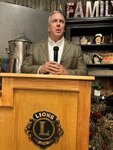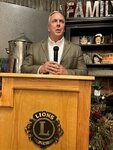

Gatesville City Manager Scott Albert recently celebrated his two-month anniversary on the job, and on July 12 he talked to the Gatesville Lions Club about the life experiences that have led him to this point.
"It's been a very busy two months," Albert said. "It feels like it's been a year already."
Albert has kept a full schedule from the start, and said the city is looking at about $21 million in capital improvements that will not require the raising of taxes.
"During my entire career I have not raised taxes, and I don't plan to raise taxes here, either," he said.
Albert's interest in public service began when he was a student at the University of Texas at Dallas, when he took a class and was inspired by Plano City Manager Tom Muehlenbeck.
"It was a light bulb moment," Albert said. "I thought, 'What an interesting career. Where else could you go and serve to make a difference in communities and lives at that level?'"
Albert changed his major from economics and finance to public administration, saying the things Muehlenbeck inspired him.
"I learned that I really am a servant at heart," Albert said. "That's what led me to a career in public service."
After serving as an intern in the city of Plano's budget department, Albert had an opportunity to enroll in the city's management training program, where he was given a chance to work in several different departments and see how a city's day-to-day operations were carried out.
"It was probably one of the best experiences of my life as far as education," he said. The day he graduated with a master's degree in public affairs, the mayor of Springtown called and offered Albert an opportunity to serve as the city administrator.
"It was one of the best experiences of my life," Albert said. "I really loved Springtown. I was there a year and a half or two years, and then a friend called and encouraged me to apply for a job opening in Fairview, Texas.
"I was hesitant because my wife and I enjoyed living in Springtown. But I saw Fairview was a growing area, and it would be a good step in my career. I learned a lot about development there and spent about five years there."
Albert then took a city leadership job in Celina and worked there for more than four years.
"Celina covers 99 square miles and will be the largest city in Collin County when it builds out." (Plano, with more than 285,000 people, currently holds that distinction).
While working in Celina, Albert discovered he had kidney cancer.
"It really changed my life and changed my focus," he said. "This was in 2005, and I went back to work with a different mindset. I backed off my career and took a job with The Economist, which did utility rate and impact fee studies in Texas and also Arizona."
Albert said he received another call from a friend who asked him "what I thought about going overseas and embedding with Marines in Fallujah (in Iraq)."
Although he had never served in the military, Albert said he was intrigued by the idea.
"After 9/11, I thought I needed to make my contribution to my country," Albert said. "I went to Fallujah in September or October 2005 and embedded with the Marines at Camp Baharia, which had replaced Camp Fallujah."
When Albert first arrived in Iraq, he flew into the airbase in Baghdad and spent two or three days there before he went to Camp Baharia.
"I got sicker than a dog with all the fecal matter in the air, my body had to adjust," he said.
A Chinook helicopter picked him up to take him to his next destination.
"I was the lone civilian," Albert said. "There were pilots and gunners on board, and it was about 2 or 3 a.m. We landed at the Fallujah base, and a Marine carried my bag and told me to wait there for somebody to pick me up. They took off, and I was alone in the middle of the night in Fallujah. I didn't see anyone around."
Finally, a Marine arrived and took him to Camp Baharia.
"I was originally going to do this for about 6-9 months," Albert said. "The time I spent with the Marines and what we accomplished was incredible. There were a lot of good stories that you didn't hear about."
One of the major projects Albert was involved in was helping to oversee construction of the Fallujah wastewater treatment plant.
"It was an over $100 million project and the largest wastewater treatment plant in Iraq," Albert said.
U.S. Ambassador Ryan Crocker asked Albert to be his "eyes and ears" when it came to the Fallujah plant.
"It was 80% complete and seven civilians had lost their lives (during construction)" Albert said. He was asked whether the work on the project should continue, and Albert recommended that it be completed.
At another area, Lt. Col. Matthew Lopez told Albert he wanted him to help oversee projects to decrease the violence in the area.
"I met with the mayor and the elders, and 28 water projects were identified which were desperately needed," Albert said. "The purpose was to improve the quality of life in Iraq and also to put money back into the district."
When U.S. forces took over reconstruction efforts in Iraq, all members of the Baathist Party were dismissed and sent home, Albert said.
"The problem was all the professionals were Baathist, because Saddam (Hussein, the former leader) was a Baathist, and if you wanted a job, you were also a Baathist."
Some of the unemployed men became involved in setting up explosive traps and shooting at Americans and Allied troops.
By once again allowing the men to work in constructive ways, "it calmed the community and you could see a decrease in violence," Albert said.
He found the work challenging and rewarding and stayed overseas working on various construction projects much longer than he anticipated - both in Iraq and Afghanistan.
"I basically stayed involved for about five years between Iraq and Afghanistan," Albert said. "I joined USAID (the U.S. Agency for International Development) and went between Iraq and Afghanistan working on different projects.
"At the end of that time I was ready to come home, and my family was ready for me to come home - I was tired. The entire time I was overseas I worked seven days a week. I said all I wanted to do was go home, sit at Starbucks and have a tea and just watch people."
Although spending so much time overseas was a sacrifice for Albert and his family, he said, "they realized this was something really important to me. I enjoy making a difference in people's lives. That's why I'm a public servant."
When Albert returned to Texas, he worked for the Riverbend Water Resources District in East Texas, which he said was about to be shut down by the state's Sunset Advisory Committee.
"East Texas is an area where we have abundant surface water, so it's very important to the Dallas-Fort Worth area," Albert said. He was able to help put the district on the right path and the state opted to keep the district operational.
Albert then worked for three years as city manager in Hondo, Texas before coming to Gatesville.
"Here I am in Gatesville, Texas and I couldn't be happier," Albert said. He has relatives in both the San Antonio area and in North Texas, so Gatesville is a central location for his family.
"It's a beautiful area and the potential is outstanding," he said. "We have a great downtown area, auditorium and access to the (Leon) river, and there's so much opportunity."
Albert pointed to the growth of the Granbury area as an example of what Gatesville has the potential to become, and also recalled when McKinney was much smaller.
"I think the same potential is here in Gatesville, as well," he said.
"I'm here to hopefully make a difference in Gatesville and to serve the community and every one of you as well."